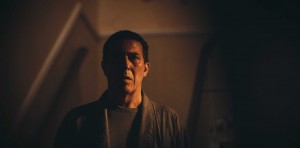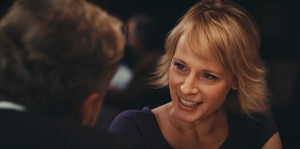I spoke with both the Tony Award-nominated playwright McPherson (“Shining City,” “The Seafarer”) and his leading man Hinds (“Munich,” “There Will Be Blood”) – who took home the Best Actor award at the 2009 Tribeca Film Festival for his performance as the haunted widower – at the chic Ace Hotel as a raging snowstorm stirred the spirits of midtown Manhattan outside.
LW: First off, it struck me that “The Eclipse” could just as easily have been staged as a play. Conor, why did you choose the medium of film?
CM: Well, I suppose my answer is…I completely disagree.
LW: O.K. Can you discuss that a bit?
CM: Well, I think it’s a film in which at its heart takes us inside a person’s grief and how they try to deal with it. On stage we only understand what’s happening within characters by what they choose to tell us. The great thing about film is that you don’t really need dialogue as much as the pictures. The camera can sort of read into a character’s mind. I thought it really needed to be a movie to take us deep into that place. There are moments when Michael gets really shocked by seeing the apparitions that happen.
On stage you can do it – and I have done it – but you’ve got to be very careful. You don’t have the kind of freedom you have with film – the kind of atmosphere that can surprise the audience as much. And I really wanted the audience to be genuinely frightened and terrified by what they were seeing. I thought that rather than just watch Michael sort of have terrified moments I wanted them to actually feel it, to
scream, to take them deeper and deeper into that experience. So then by the end they’ll also feel a sense of joy, and relief, and identification with the character.
LW: Speaking of the supernatural element, Ciaran, you also did Conor’s play “The Seafarer” here on Broadway. Can you talk a little about your relationship?
CH: With Conor? Well, I think we have a quite good, healthy relationship.

LW: (laughs) But how did you meet? How did this start?
CH: Well, about ten years ago. I mean, I’d been aware of Conor before that but we never really met. We were involved in the Dublin Theater Festival when I was in three one-act plays. Conor directed one of them so we were collaborators. We just got along very well, chatted and shared a few stories. Then when Conor was moving “The Seafarer” from London to New York he was kind enough to ask me if I’d join the cast. From there we formed a deeper friendship and he eventually passed me the draft of “The Eclipse.”
LW: So Conor, how did the rest of the cast come together? I mean, you’ve got Aidan Quinn, which was kind of a surprise to me. The way he works almost seems to be the polar opposite of the way Ciaran does. Of course, that’s just my own impression. Though you all seem to have a great rapport. Can you discuss this?
CM: Well, casting is such a huge part of any production.
LW: Especially this type of piece.
CM: Yeah, of course, because if they don’t have a rapport we’re dead in the water. But I think all the actors in this movie have a sort of openness about their acting. Iben has a real natural quality to her. She’s very straightforward.
LW: (to Ciaran) And you and Iben have an amazing rapport as well.
CH: I’m glad you say that because it’s not really something you can fake. You do have to really connect, and I think, in all honesty, that we did.
LW: I think you both really listened to each other. That’s half the battle right there. There’s an unpredictability that occurs when you’re actually listening to someone and reacting in the moment.
CM: It’s funny because when you’re filming you have headphones on so you can hear what the sound is recording. So often while you’re waiting to do a take I’d have my headphones on and Ciaran and Iben would be chatting to each other, just a nice light chat. Then the scene would start and they would just sort of segue into that. And then the scene would end – and their conversation would pick up again! They just had a very easy relationship like that. (laughs)
A lot of times it would seem like they would just spend the whole day chatting. But with Aidan – like his character in a way – Aidan has a more intense, and I would say perhaps even fraught, process when he’s acting. In a way it really mirrored the dynamic of the characters. Aidan was sort of fighting his way into this character because he felt like this guy at first comes off like a jerk – but that he’s like that because he’s in a lot of pain.

He’s weakened because he’s getting older. He’s famous and successful and good-looking, but he’s feeling his own mortality. He’s thinking that if this woman doesn’t return my affection it’s going to f*cking crush me to death! So he’s real. Aidan just brought this incredible intensity to his process like that. There’s the scene where they get into the fight –
LW: He reminded me of Dennis Hopper then.
CH: Oh, wow.
LW: In the sense that you wonder is that acting or is that the person? (laughs) You’re not quite sure, which is nice. And scary, too.
CH: But Aidan is nice.
LW: Oh, is he? That’s good. (laughs)
CH: Yeah, yeah, yeah. He just puts himself into that place for maybe ten minutes when he’s like I’m not going to be so nice!
LW: But you’d never worked with Aidan or Iben before, right?
CH: No, but I knew Aidan socially through friends.
LW: That must have helped a bit.
CH: Oh, yes, it’s a great joy to work with him.
LW: Now was it the casting director’s decision to bring them on or was it yours, Conor?
CM: Iben came through a casting director named Gail Stevens. It was almost one of those things where it was a magical moment. I knew who Iben was from “High Fidelity,” but I hadn’t seen her for awhile since she’d been working in Scandinavia.
One day I was talking to Gail Stevens, saying I was looking for that kind of actress who’s, like, yeah they’re an actor but they’re not really “acting.” Like Catherine Keener. A very grounded kind of person. You know, that sort of actress who’s very serious but also very open.
The next day Gail sends me a message, tells me to open my email because this actress named Iben just walked into her office. So I get this email from Iben saying, “Hi, Conor. I’m Iben. This is the front.” (points to his face) “This is the right side.” (touches his right cheek) “This is the left.” (touches his left cheek) “This is the back.” (points to the back of his head) –

LW: And you cast her like that?
CH: What more could you want?
CM: There was no guile, no trying to do a number on anyone. It was just, “Here I am.” So we met up and it was like, what you see is what you get. And in the movie that’s what she’s like, too. I think with both Ciaran and Iben in the movie, yes, they’re acting and playing characters but I think there’s a lot of their real personalities in there, too.
LW: I felt that as well. There was a sort of natural, organic flow to all the dialogue.
CH: I’m glad it worked out that way. I know from Conor’s standpoint it’s so important that you believe everything that’s occurring despite the high stakes you have, say, with Michael. Because by the time the paranormal, this image of horror comes about it’s important that the audience is truly with those characters. When the shock or jolt happens it’s important that they also understand the pain that’s involved.
LW: It’s interesting that you brought that up because though you bring a deep humanity to the character, the character of Michael is nearly Shakespearean. He’s a ghost of his former self just like the ghosts that appear to haunt him. How did you develop the character?
CH: Well, Conor developed the character first from Billy Roche’s short story. I suppose it was more of what you would call a collaboration. I couldn’t define, really, what belonged to who.
CM: When I’m directing actors what I really try to do is to try to get the character – even if it’s very different from the actor’s real personality – as close as I can to the actor. With Michael even though Ciaran is playing a character I think a lot of his natural qualities shine through Michael. There’s a genuine warmth and attractiveness I suppose that can’t be acted.
But you’re right about the Shakespearean quality. Michael is a sort of everyman. He’s haunted, he’s a father, he’s a good father, he’s a bad father, he’s a son, he’s in mourning, he’s falling in love, he’s a fighter. And yet Ciaran manages to let the character evolve without ever making it seem that any of these qualities are unlikely.
LW: Which grounds the over-the-top supernatural element of the film in a fundamental reality.
CM: Yes, yes.
LW: Well, I’m getting a wave from the publicist so it looks like my time is up. Thank you both so much for speaking with me.
CH: And thank you for coming out in the middle of this snowstorm.
LW: I wouldn’t have missed it for the world.

hello I love this film I have it on DVD the cast in the eclipse are fantastic it’s a film we can all relate to I lost My Mum in 2001 with cancer, so this film is comforting and what can you say we have the wonderful Actor Ciaran Hinds as Michael Farr it was great that he was the leading actor Conor McPherson has great taste
from Gillian in Dundee